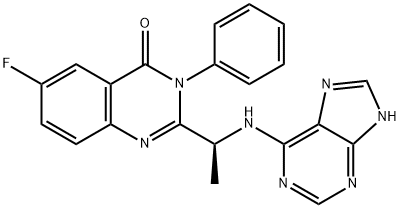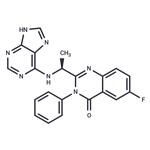Biological Activity
acalisib (gs-9820) is a potent and selective inhibitor of pi3kδ with ic50 value of 12.7 nm [1].phosphoinositide 3-kinases (pi3ks) are a family of lipid kinases that phosphorylating the 3’-hydroxyl group of phosphatidylinositol-4,5-bisphosphate (pip2) to produce phosphatidylinositol-3,4,5-trisphosphate (pip3). pi3ks plays important roles in cell proliferation, survival, differentiation and metabolism. pi3kδ plays an important role in inflammation, immune function, cell migration and vesicle trafficking, and is highly expressed in cells of hematopoietic origin [1].acalisib (gs-9820) is a potent and selective pi3kδ inhibitor. gs-9820 inhibited pi3kα, β, γ and δ with ic50 values of 5441, 3377, 1389 and 12.7 nm, respectively. in fibroblasts, gs-9820 inhibited pdgf- and lpa-induced pakt with ic50 values of 11,585 and 2,069 nm respectively, which were through pi3kα and pi3kβ. in basophils, gs-9820 inhibited fcεri pi3kδ- and fmlp pi3kγ-mediated cd63 expression with ec50 values of 14 nm and 2,065 nm, respectively. in isolated rat osteoclasts, gs-9820 induced prompt retraction of lamellipodia by 65-75% within 10-15 min. gs-9820 also significantly reduced the incidence of f-actin belts and inhibited osteoclast survival stimulated by rankl [1].
in vitro
Acalisib (GS-9820) is more selective for PI3Kδ (IC 50 =12.7 nM) relative to other PI3K class I enzymes (IC 50 : PI3Kα , 5,441 nM; PI3Kβ, 3,377 nM; PI3Kγ, 1,389 nM). Acalisib is also 10 3 -fold more selective against PI3Kδ than against related kinases, such as PI3KCIIβ (IC 50 >10 nM), hVPS34 (IC 50 =12.7 μM), DNA-PK (IC 50 =18.7 μM), and mTOR (IC 50 < /sub> >10 nM). In fibroblasts, the PDGF receptor signals through PI3Kα and the GPCR for lysophosphatidic acid (LPA) signals through PI3Kβ. Acalisib reduces PDGF-induced pAkt by only 50% at 11,585 nM, and LPA-induced pAkt by 50% at 2,069 nM.
in vivo
To dissect the relative contribution of PI3Kα and PI3Kδ inhibition in the reduction of obesity, obese hyperphagic ob/ob mice are treated with a selective PI3Kα inhibitor, BYL-719, or with a selective PI3Kδ inhibitor, Acalisib (GS -9820). Remarkably, BYL-719 reduces body weight after 15 days of treatment to a similar extent as CNIO-PI3Ki, whereas Acalisib has no significant effect at the same doses as BYL-719. It should be noted that 10 mg/kg of Acalisib is sufficient to reduce the growth of multiple myeloma xenografts in mice.
References
[1]. shugg rp, thomson a, tanabe n, et al. effects of isoform-selective phosphatidylinositol 3-kinase inhibitors on osteoclasts: actions on cytoskeletal organization, survival, and resorption. j biol chem, 2013, 288(49): 35346-35357.

